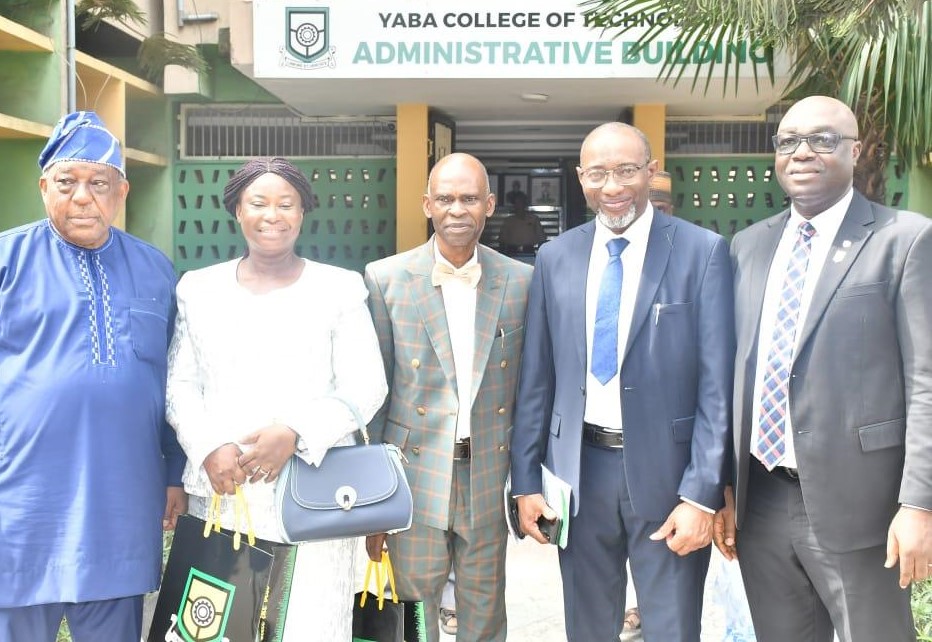The Rector, Yaba College of Technology, Dr. Engr Ibraheem Abdul has asserted that an efficient transportation system and infrastructural development in Nigeria are the bedrock to the nation’s economic prosperity.
He made the assertion at the third edition of TPL Dr. Abubakar Mobolaji Olaseni’s Annual Lecture Series, themed “Unlocking Nigeria’s Socio-economic Potentials through Improved Sustainable Transportation and Infrastructure Development,” held at the Yusuf Grillo Auditorium.
The Rector emphasized the critical role of transportation and infrastructure in Nigeria’s economic prosperity and the significance of an efficient transportation system for economic growth.
He highlighted the prevalent challenges within Nigeria’s transportation sector and stressed the urgent need for comprehensive reforms; urging that the country should in earnest desire a more functional transportation system.
Dr. Abdul hinted that his administration will give birth to a series of lectures in which topical and relevant issues will be thoroughly discussed in the pursuit of excellence in all spheres of Nigeria’s endeavors.
The Chairman of the Lecture, who is also the 16th President, Chartered Institute of Taxation of Nigeria, Bar. Samuel Agbeluyi, in his opening remarks that Nigeria possesses an inadequate network of physical infrastructure, including roads, railways, power facilities, and telecommunication systems, among others.
He said that social infrastructure such as education, water supply, and healthcare, which are essential for enhancing the overall welfare of the citizens, is inadequate, while a sizable number of the existing infrastructures are in a deteriorating state, requiring urgent repair, rehabilitation, or replacement.
According to him, “as we delve into discussions surrounding this pertinent topic, it is imperative that we recognize the pivotal role that sustainable transportation and infrastructural development play in unlocking Nigeria’s vast socio-economic potential.”.
The guest lecturer, Professor of Geography and Regional Planning, Olabisi Onabanjo University, Ago-Iwoye, Ogun State, and a former Commissioner for Transport in Lagos State, Tpl. Prof. Bamidele Abiona Badejo advocated for professionalism in handling the Nigerian transportation system if Nigeria is to unlock its socio-economic potential.
Prof. Badejo suggested that there is a need to urgently improve the current situation of the transport modes available in Nigeria, and public enlightenment, public engagement, public education, and robust publicity and advocacy should be embarked upon without gatekeeping the experts.
He explained further that there is a need to develop a strategic framework that will coordinate and integrate all the transport modes and their policies together.
The former Lagos State Commissioner for Transport hinted that since transport is regarded as the engine of growth and development, it is desirable to have in place a transport policy that will guide its relationship with the socio-economic development agenda put in place so as to calm the nerves of the schools of thought where necessary and applicable.
The celebrant, Tpl Dr. Abubakar Mobolaji Olaseni in his appreciation address, affirmed the guest lecturer’s position that it is expedient and germane to develop a modern transport system for the success of the economic exploitative motive in Nigeria.
The lecture, he said, has been very insightful and a summary of the entire sphere of the field of transport and transport infrastructure for national socio-economic development, with the established fact that without transport, a community will be unable to realize its socio-economic potential.
According to him, “as we navigate the future, both the federal and state governments should generate transport policies for use. The Federal Government draft policy of 2010 and the Lagos State Government draft transport policy of 2018 should, as a matter of priority, be concluded and published. This is to develop an adequate, safe, environmentally sound, and efficient transport system, in the context of a progressive and competitive economy.
In addition, the new paradigm being introduced by Artificial intelligence should catch our attention in unlocking Nigeria’s socio-economic potential. Everywhere you turn now, it is AI, AI, AI and the specific areas Artificial intelligence is revolutionizing in the field of urban transport, among others, are autonomous vehicles, real time traffic management, and ride sharing platforms. Embracing these, will assist in improving sustainable transportation and infrastructure development and, hence, unlock Nigeria’s socio-economic potential.






